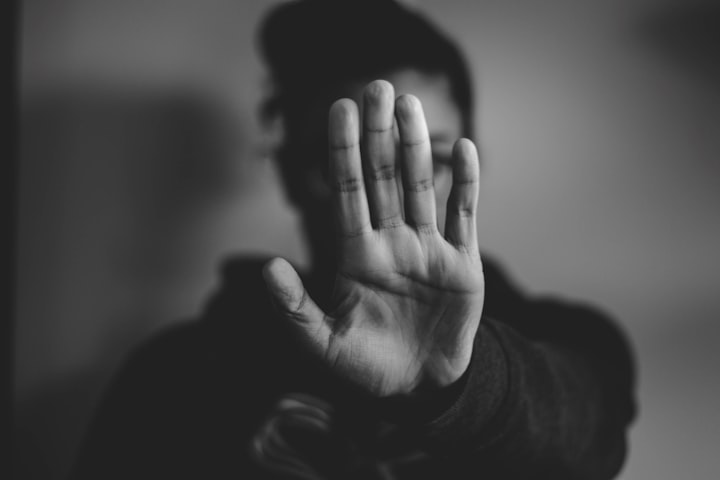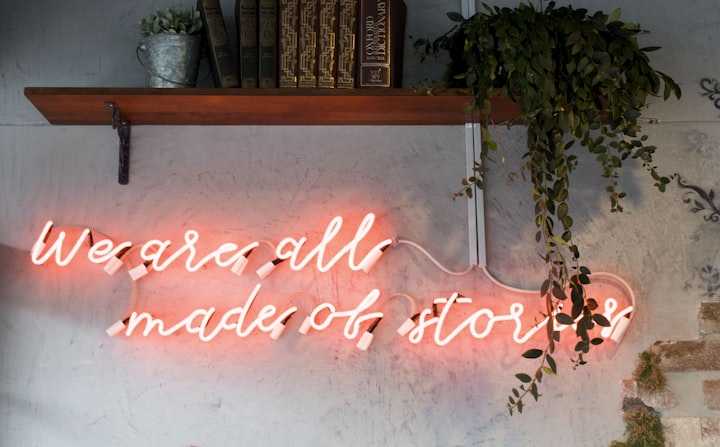It Isn't a Child's Job to Heal Their Parent's Trauma
Let these two horrible comments on one of my childhood trauma stories be a lesson for all of us.

After years of writing and talking about my trauma on the internet, I don’t consider myself easily surprised. That all changed, however, when I logged on a few days ago to see a comment section that truly shocked me.
The comments were on a post I had recently written. The title? Let’s Talk About the Time My Mother Abandoned Me on the Side of the Road.
In the article, I detail an encounter with my mother in which she kicked me (17 years old at the time) out of a car after threatening me and getting angry at me. For pretty obvious reasons, it was a traumatizing event. The point of the story was to capture that trauma and describe how it still touches me to this day.
Most of the comments on the story were kind and supportive, but the shock came when I found a thread of 2 adults berating me for the traumatic event. Yes, you read that correctly. Two grown adults with their real names and profile pictures took to the comments and told me that my mother’s abuse was my fault because I didn’t “love her enough.”
The two posters went back and forth, comparing their traumas to mine and describing, in detail, why I had failed my mother as a child for not loving her past the trauma she inflicted on me.
Your mother was traumatized…no one loved her enough, including you.
The comments were heartbreaking. They were gut-wrenching. But most of all, they were infuriating.
It’s not a child’s job to love their parent out of trauma.
As a society, we seem to understand that children aren’t capable of consenting to the abuse that is inflicted on them sexually. When it comes to the psychological abuse inflicted on children by parents, however, we (by and large) tend to act as though parents are entitled to the radical consent of their children. It’s a strange sort of hypocrisy and it was on display in my comment section.
These two strangers ingested the story of child-me fearing for her life on a roadside and decided to hoist the blame squarely on my shoulders.
They based all of this on a sliver of knowledge: my mother was traumatized as a child. From there, they made the split-second decision to do what everyone else in my life chose to do —excuse every horrible thing that she did. Show her the mercy that they weren’t ever willing to show me.
Somehow it came back, like some kind of cosmic, sh*t-caked boomerang, the way it always did. That little girl growing up in a dirty house filled with sewage and animal feces was to blame for the actions of the adults around her. The comments were disgusting and I told the posters so.
It brings light back to this same fundamental problem.
As a society, we are too willing to gaslight the survivors of parental abuse. Still, as far as we have come, we are too quick to hoist the burden of abuse onto the shoulders of innocents who can neither ask nor consent to the experience. It’s soul-crushing to realize.
These two strangers were so fast to point the finger at a child when an adult chose to harm that child. They were so quick to look past my mother’s litany of faults and shame me for the experience that left me catatonic in shock for the rest of the day. (Seriously, go read the article. It was one of the scariest things I’ve ever experienced.)
It’s not a child’s job to love their parent out of that parent’s trauma. It’s not their job to look past blatant abuse, to accept the damage that comes from a conscious adult when they don’t even have the emotional skillset to defend themselves.
Adults are responsible for their own behavior.
Commenters like those who made the disgusting remarks on my story would be all too quick to point out my faults (indeed, they were), but they have no issue looking past the mental, physical, and spiritual abuse a 40-year-old woman chose to inflict. A dangerous sort of hypocrisy of which both commenters seemed to be blatantly unaware.
Behavior like this happens for a reason.
What alarmed me and infuriated me even more than the comments themselves was the motivation behind it. See, when people make ignorant statements like this, they are laying themselves bare. You see this type of thing a lot in narcissistic and antisocial personalities. They expose themselves in their grandiose judgments of others. That’s certainly what happened here.
The first commenter declared his ignorance like a scarlet letter when he went out of his way to say, “Everyone failed your mother, including you.” It was clear he had done no due diligence, and hadn’t bothered to read the full scope of the story or any of the multitude of others that I have published on this platform.
Everyone failed my mother, he said. Despite the fact that everyone encouraged my mother to seek treatment, even decades before I was born. Despite the fact that she had incredible health insurance, was white, and lived in the upper middle class. Despite the fact that she entered therapy, was diagnosed, medicated, and refused to take that medication or continue treatment? (Because, ego.)
The gentleman who started the storm stood proudly on a podium (my comment section) and made a statement he had no evidence to support. And in that, he kicked off a storm for another ignoramus to display the incredible faults in their personality.
I told you behavior like this happens for a reason, and commenter #2 made that abundantly clear when she blamed 17-year-old me for the trauma her mother inflicted. This commenter doubled down and dismissed my experience entirely by inserting their own and insinuating that they alone (in the billions of people on this planet) had experienced a “true narcissist”.
The thread spiraled into Oppression Olympics™️.
Not only were doubts cast on my experience and the right I had to respond to it. Both of the commenters went on to dismiss the entire thing out of hand.
Because they knew best. They knew more. They were more knowledgeable of my experience than I was and they were going to tell the world about it — damn how it affected me.
Behavior like this happens for a reason.
Do you see it yet? Is it as obvious to you as it was to me?
Two people who couldn’t help but suck up all the oxygen in the room. Two people who were willing to insert themselves over the story of a child and the harm she was subjected to by a mother who knew what she was doing. Here it was again. Two people who wanted the world to know that they were bleeding, that their experience was the hardest, the biggest, the worst.
Two people who were lightning fast to shift blame to a child…when they themselves have children at home…
Behavior like this happens for a reason.
We could do better. If we wanted to.
I wish I could say that comments like this were uncommon. I wish I could say that every time I tell one of these stories I’m met with compassion and understanding, or at least an attempt at dialogue. But that would be a lie.
It doesn’t matter what platform I’m on, or where I share these stories. Ignorance always creeps in. Which is a shame, because it doesn’t have to be this way. We’re living in an incredible age of access to knowledge. We could all do better, and be better…if we wanted to.
That’s one of the big lessons I try to push with my stories, especially the stories about my mother (and why it proves her narcissism). She *could* have been better. She could have chosen different behaviors and chosen to be a better mother, but she didn’t. She refused to take her medicine, to get treatment because she wanted to hurt her children.
My mother took the easier path. Ignorance. She treated me the same way she was treated as a child, even though she knew it was wrong.
She chose to keep repeating the pattern, just like the ignorant commenters on my story. They are choosing to be narcissistic in their approach to the experiences of others. They are choosing not to listen. They are choosing not to learn. They chose to go into my comments — a real human being — and say things that they knew were going to be hurtful (or controversial at best).
They made that choice because they wanted to make that choice. Because the only person they can see is themselves. That’s easy. Me, me, me is always easier than *really* looking in the mirror. Than keeping mouths shut and allowing space for someone to have an experience not understood or agreed with.
These two strangers chose to single me out and put that on me and they’re probably out there in the world right now making that same choice with others. And that’s what’s really sad about all of this. It’s a part of a bigger pattern that we could all change if we bothered to do the work.
How did I respond? Angrily. And you should too.
The only thing I’ll say in closing is that responses like those given to me by these strangers are unacceptable. I’m not going to post them here, because I don’t want them to get any more traction for their arrogance or their ignorance, but everyone should know this.
I responded in blistering rage to their comments on my story.
In truth, once the initial shock passed, I didn’t care. I wasn’t emotionally attached to the horrid things they wrote, but I wanted them to carry a lesson the next time they came across my story (or the story of other trauma survivors). I wanted them to think twice about someone else’s experience before injecting their own limited one over the top.
And that’s how we all should respond to people refusing to hold space for the least of us.
It should enrage you when someone shoots down your experiences or tells you that you don’t have a right to feel your own emotions.
You have a right to set boundaries. You have a right to shoot a warning shot across the bow and tell narcissistic, selfish, manipulative, or otherwise abusive people — not here. You may get away with that somewhere else, but not here.
Hopefully, they took that lesson to heart. Hopefully, they won’t take up 500+ words of someone else’s comment section, telling them that their childhood experiences are unworthy of processing, unworthy of discussion. Hopefully, they’ll think twice before blaming a child for the abusive behavior of their parents the next time.
Probably not. As I said, this behavior happens for a reason, and those who display it aren’t notorious for change or awareness. I suppose we’ll see what happens in the next comment section. Who knows? Maybe it will be this one…but hopefully not.
© E.B. Johnson 2023
E.B. Johnson is a top writer on mental health, relationships, and narcissistic abuse. Through her coaching, writing, and podcasting, she helps women lead meaningful and peaceful lives after a lifetime of childhood trauma and narcissistic entanglement.
About the Creator
E.B. Johnson
E.B. Johnson is a writer, coach, and podcaster who likes to explore the line between humanity and chaos.






Comments
There are no comments for this story
Be the first to respond and start the conversation.